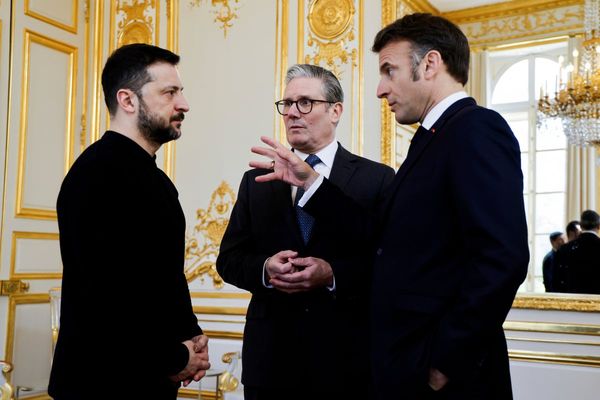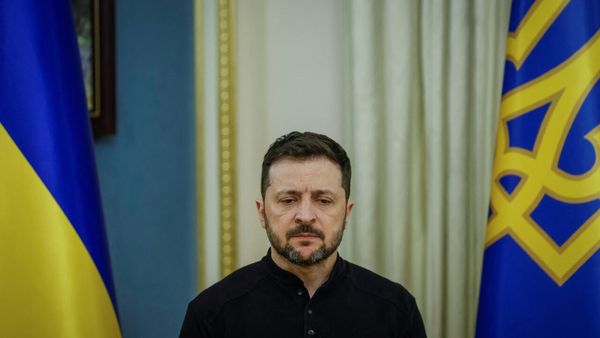
It says a lot about the Ukrainian people’s awful options that the big question is whether Vladimir Putin is crazy or just pretending to be crazy. For some, last night’s entirely improvised, heavily staged speech to his security council was an indication that the Russian president has finally gone mad – a remote diagnosis that suggests we might look back on such things as the annexing of Crimea and the deployment of nerve agent in historic Wiltshire as “his good years”.
I should say right off the bat that I have no idea whether Putin has or hasn’t gone mad – however unfashionable not knowing things may be these days. As Russian tanks roll into Ukraine and the western powers debate whether it technically is or isn’t an invasion, you have to say this phoney war really does boast an unbelievable headcount of phoneys.
Russia experts now seem to outnumber even Russian army personnel. Column inches and airwaves and social media channels are truly awash with those blessed with the confidence to begin “here’s how Putin thinks…” or “watch what happens next”. Who knew the potential advent of war would feel like being the girl in the nightclub meme, with some PPE bore bellowing his take in your ear as you wonder if 21st-century geopolitics has an Ask for Angela option. That said, it’s great to see Britain boasting such an adaptable and highly reactive workforce, able to retrain at enviable speed. The people who became trade experts in 2016, then became epidemiology experts in 2020, have now become Russian politics experts.
My sole area of expertise – and it’s not even that, if we’re honest – is “the type of people who become newspaper columnists”. So take it from one who knows: Boris Johnson looks like he knows enough about the entire Russia-Ukraine subject to write two newspaper columns on it. Three, tops, if you count a rehash of his referendum campaign speech when he blamed the EU for Putin being forced to invade Ukraine last time round. I see Johnson has this morning “unveiled” some sanctions on five Russian banks and a grand total of three high net worth individuals. If Putin makes further incursions, he can expect a fixed penalty notice (overturned on appeal).
But back to last night in Moscow and Putin himself – the only megarich Russian who doesn’t get their cosmetic surgery done in London. His face is now so impassive that it must have had an entire Real Housewives franchise worth of work. To watch his Lebensraum speech was to be given the shivers, but also to be struck by the grotesque self-pity of it all. Why are strongmen like this? The age has been awash with such politicians, from Trump to Kim to Bolsonaro, with their endless, aggressively maudlin demands for respect. Putin feels like the world-war version of every guy you’ve ever trodden on eggshells around because “his bark’s worse than his bite” or “that way he’ll calm down quicker”, only to discover one day that it isn’t and he won’t. Further along the human centipede, these sentimental hardmen are assisted by media Haw Haws like Fox News’s Tucker Carlson or GB News’s Nigel Farage – guys with such an overwhelming yen for the respect they feel they themselves were denied at some key point in their lives that their deepest human empathy is reserved for a foreign authoritarian also not getting his due.
Is a lack of respect really what’s happening? To this untrained observer, with only her memories to go on, it does feel rather as if Vlad has been ardently pursuing diplomatic resolution with Ukraine somewhat in the way Dubya Bush was ardently pursing diplomatic resolution with Iraq in early 2003. Which is to say, there seems a rather unconvincing theatre to it all. And, indeed, a law of unintended consequences. Four years after the Iraq invasion, one V Putin delivered a conference speech in Munich in which he fumed about US actions in Iraq, lamenting that now “no one can feel that international law is like a stone wall that will protect them”. Which has arguably turned out to be some more rather unconvincing theatre in itself.
Spool forward to the present day, and events seem to be developing very fast. Perhaps this is what the early stages of war look like. Sajid Javid felt confident enough to call last night’s tank manoeuvres an “invasion”, which contrasts markedly with the grey area/brainmelt defence secretary Geoff Hoon found himself in back in 2003 after the first night of shock-and-awe bombing of Baghdad. Seconds before he was about to go live on a breakfast TV interview the next morning, Hoon turned frantically to an aide and asked “Are we at war?” “Geoff, we’re in the initial stages,” came the calming response. “Yes, but are we at war?!” Hoon wanted to know. “We’re in the initial stages,” he was firmly told again. I mean … he was secretary of state for defence. Nobody knows anything, do they?
For those of us with the incalculable luxury of watching events from afar, meanwhile, the images currently on our screens are striking yet timeworn. The male-female ratio is wild, with giant roomfuls of men in suits from New York to Moscow punctuated by only the odd woman – Liz Truss, say, or Valentina Matviyenko, the sole female at Putin’s security council event. An unwritten law dictates that each of the leading men must be photographed scowling into a telephone diurnally, as though someone has just said “I’m afraid there is a problem with your order – your order to invade/de-escalate/stage a false flag/buy gas from Russia ever again.”
Live action shots are more fraught. Politicians wary of going accidentally off-message, In the Loop-style, prefer the deniable safety of metaphors – and some of them tend toward the Freudian. “We’ve got to make sure that we cut the umbilicus,” explained Johnson of European reliance on Russian gas supplies. “We snip the drip-feed into the bloodstream from Nord Stream.” Righto. Will Johnson stick around long enough to cut the umbilical cord? (Hardly the first time that question’s been asked.)
Unfortunately, the media appearance in which the prime minister intimated he had liberated Britain from Covid clashed in the schedules with the media appearance in which Putin intimated he was about to liberate Ukraine from itself. Consequently, Johnson’s event lost a bit of its oomph. After all, while some people might regard it as the last word in liberty not to have to isolate if they have Covid, others might feel the time for such first-world crowing has passed. There are freedoms and “freedoms”, aren’t there? And one might be about to put the other firmly into perspective.
Marina Hyde is a Guardian columnist







